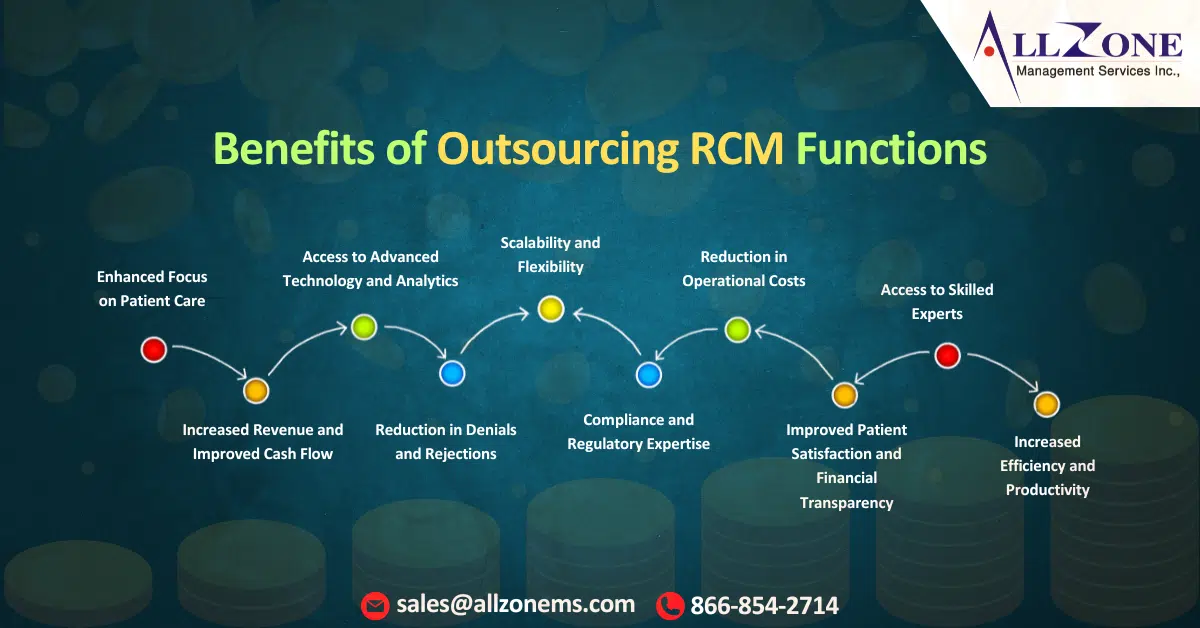Here’s a rewritten version of the provided text, aiming for a more concise and impactful delivery:
Navigating the complexities of today’s healthcare revenue cycle management (RCM) presents a significant challenge for providers. A key advantage of Revenue Cycle Management outsourcing lies in its ability to alleviate these substantial administrative burdens, which often escalate with evolving regulations, reimbursement models, and patient expectations.
Consequently, a growing number of healthcare organizations are choosing to outsource their financial management, allowing them to prioritize patient care while entrusting their financial well-being to specialized professionals. This newsletter explores the numerous benefits of outsourcing RCM functions, demonstrating its transformative potential for healthcare organizations, both operationally and financially.
1. Sharpened Focus on Patient Care
A primary benefit of RCM outsourcing is the enhanced ability for healthcare providers to concentrate on their core mission: delivering high-quality patient care. Managing RCM internally can be time-consuming and demanding, diverting attention from patient needs. By outsourcing these functions, dedicated resources can be redirected to clinical operations, lessening the administrative load on healthcare teams and ultimately leading to improved patient care.
2. Boosted Revenue and Enhanced Cash Flow
An effective RCM partner optimizes the revenue cycle, ensuring accurate and timely claim processing. Experienced vendors excel at streamlining claims, lowering rejection rates, and maximizing collections. Their in-depth knowledge of payer policies and coding requirements minimizes denials, directly improving cash flow. Furthermore, many RCM providers leverage advanced technologies like automation and predictive analytics to accelerate billing cycles, leading to reduced accounts receivable days (AR days) and greater financial stability for healthcare providers.
3. Access to Cutting-Edge Technology and Analytics
Outsourcing RCM provides access to sophisticated technology that might be too expensive or complex to implement internally. RCM vendors commonly utilize automation, artificial intelligence (AI), and data analytics to refine billing processes and enhance revenue capture – a significant advantage of outsourcing. These tools enable predictive analytics for forecasting trends, identifying potential risks, and improving revenue cycle decision-making. Real-time reporting dashboards offered by RCM vendors allow healthcare providers to track crucial KPIs, facilitating data-driven decisions and enabling them to remain competitive in the evolving digital healthcare landscape without significant in-house technology investments.
4. Minimized Denials and Rejections
Claim denials and rejections can significantly impact healthcare revenue. By outsourcing Revenue Cycle Management, providers can mitigate these issues through the expertise of specialized vendors in medical coding, billing, and payer requirements. Outsourced RCM teams are skilled in identifying the root causes of denials and implementing proactive strategies, including thorough preauthorization, accurate coding, and timely claim submission. Partnering with an experienced RCM provider can substantially reduce denial rates, minimize lost revenue, and free up time spent on appeals and resubmissions.
5. Enhanced Scalability and Flexibility
Outsourcing RCM functions allows healthcare providers to scale their services according to their evolving needs. Whether it’s a small clinic or a large health system, RCM vendors can tailor their services to match the organization’s volume, size, and specific requirements. This scalability is particularly beneficial during peak demand periods or for healthcare organizations expanding their services or locations. They can ensure their revenue cycle operations grow seamlessly alongside their service offerings without the added burden of recruiting and training new staff.
6. Deep Compliance and Regulatory Expertise
The heavily regulated healthcare industry demands constant vigilance regarding billing codes, compliance standards, and reimbursement rules. Noncompliance can lead to significant financial penalties and reputational damage. Outsourcing RCM to experienced vendors provides access to specialists well-versed in these regulations, including HIPAA, ICD-10/ICD-11 coding standards, and CMS guidelines. This partnership minimizes compliance risks and ensures adherence to the latest changes, safeguarding patient privacy and security.
7. Reduced Operational Expenditures
Managing RCM in-house entails considerable costs associated with recruiting, training, and retaining skilled billing and coding professionals. Additionally, investments in necessary technology, software, and security measures are essential. Outsourcing RCM functions can significantly reduce these costs by eliminating the need for an in-house team and its associated infrastructure. Most RCM vendors offer customizable pricing models, allowing providers to pay only for the services they need, leading to more affordable and cost-effective RCM.
8. Improved Patient Satisfaction and Financial Clarity
In an era of rising healthcare costs, outsourced RCM providers contribute to improved patient satisfaction through clear and transparent billing processes. They assist patients in understanding their bills and financial obligations, often offering financial services like payment portals, payment plans, and financial counseling. By providing timely billing support and resolving issues promptly, outsourced RCM providers contribute to a positive patient experience, fostering satisfaction, loyalty, and trust.
9. Access to Specialized Talent
Healthcare billing, coding, and compliance require specialized knowledge. Outsourcing RCM grants healthcare providers access to a team of seasoned professionals trained in the intricacies of revenue cycle management. Beyond certified coders and billing specialists, RCM vendors possess expertise in navigating payer negotiations and denial resolutions, providing valuable best practices and industry insights that enhance accuracy, accelerate claim processing, and increase reimbursements.
10. Enhanced Efficiency and Productivity
A seamless RCM process necessitates smooth coordination across various functions, from patient registration to final payment. By outsourcing Revenue Cycle Management, healthcare organizations can streamline these processes. RCM vendors implement standardized procedures, automation, and technology to minimize manual errors and expedite administrative tasks. This not only reduces administrative burdens but also boosts productivity and ensures the efficient operation of the entire revenue cycle, leading to faster reimbursements, less rework, and more predictable cash flow.
In Conclusion
The benefits of outsourcing RCM functions are multifaceted, encompassing reduced operational costs, increased revenue, improved patient satisfaction, and assured regulatory compliance. By entrusting RCM tasks to specialized vendors, healthcare organizations can refocus on their core mission of providing quality patient care. Outsourcing also provides access to advanced technology, scalability, specialized expertise, and compliance support, making it a compelling strategy for healthcare providers of all sizes. While the decision to outsource RCM functions depends on an organization’s unique needs and objectives, it offers a powerful pathway for many providers to strengthen financial performance, alleviate administrative burdens, and enhance both patient and staff satisfaction.

